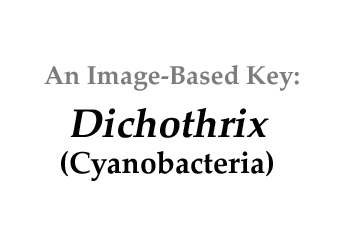|
Home / Cyanobacteria / Filaments / Branched / Pseudobranches / tapered / Dichothrix |
||||
|
|
|
|||
|
Click on images for larger format |
||||
Name derivation: |
||||
|
From the Greek, dicha=diche, in two, and thrix, genit. trichos, the hair
|
||||
Classification: |
||||
Dichothrix Zanardini ex Bornet and Flahault 1886;25 of 33 species descriptions are currently accepted taxonomically (Guiry and Guiry 2013).Order Nostocales; Family Rivulariaceae
|
||||
Morphology: |
||||
|
Tapered trichomes with trichome ends resembling hair, embedded in dense, often iron-stained, mucilaginous sheath. Many lateral false branching next to the basal heterocysts.
|
||||
Similar genera: |
||||
|
Similar to Calothrix but with numerous pseudobranches resulting in "tufts" of filaments attached to a substratum.
|
||||
Probable Allelopathy |
||||
|
Dichothrix utahensis from Molasses Reef, Key Largo Florida USA contains a protease inhibitor thought to reduce digestion in predators. It also inhibits elastase that disrupts microtubules (Gunasekera et al. 2010). |
||||
Habitat: |
||||
|
On stones and vegetation in fast streams. Also found in the marine intertidal zone. |
||||
References: |
||||
|
Bornet, É. and C. Flahault 1886. Revision des Nostocacées hétérocystées contenues dans les principaux herbiers de France. Annales des Sciences Naturelles, Botanique, Septième série 3: 323-381. Guiry, M.D. and G.M. Guiry 2013. AlgaeBase. World-wide electronic publication, National University of Ireland, Galway. http://www.algaebase.org; searched on 28 February 2013. Gunasekera, S.P., M.W. Miller, J.C. Kwan, H. Luesch and V.J. Paul 2010. Molassamide, a depsipeptide serine protease inhibitor from the marine cyanobacterium Dichothrix utahensisJournal of Natural Products 73:459-462. |
||||
|
Home / Cyanobacteria / Filaments / Branched / Pseudobranches / tapered / Dichothrix |
||||



